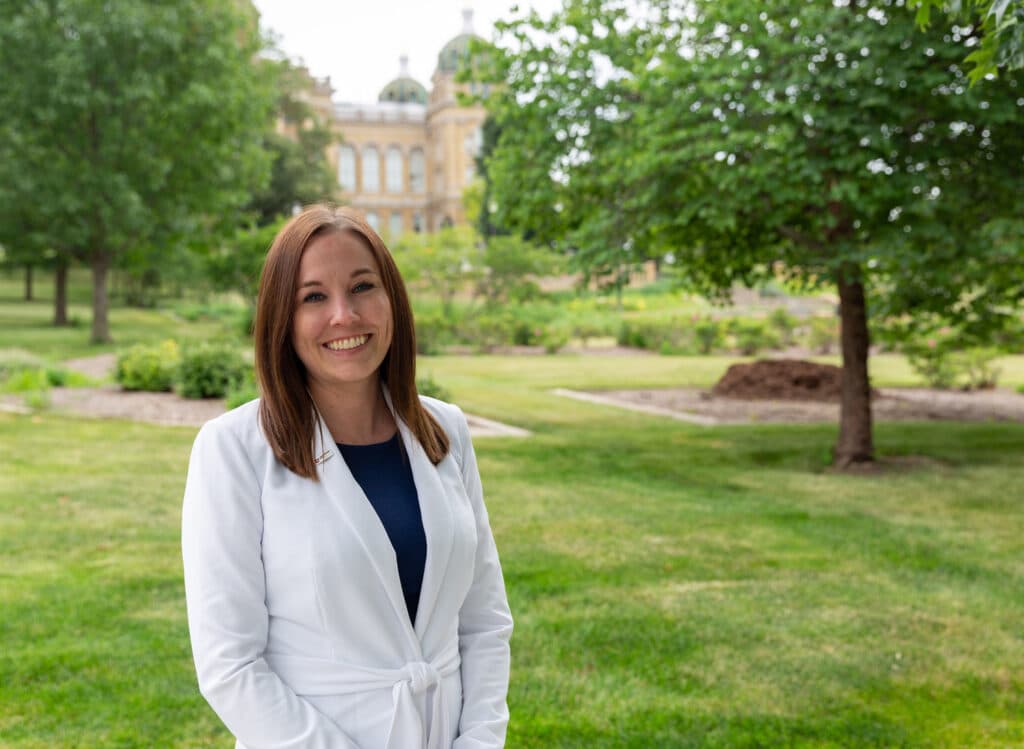Scribes catching on in Iowa
emerging field helps cut medical costs, improve patient care

JOE GARDYASZ Nov 20, 2015 | 12:00 pm
3 min read time
781 wordsBusiness Record Insider, Health and WellnessEmergency room doctors in Greater Des Moines have a new resource at their side to help them provide faster, more efficient patient care: medical scribes.
Since July, each emergency department physician at Mercy Medical Center – Des Moines has been paired with a medical scribe. The scribes’ duties are to record and follow up on patient information, which frees the doctors to focus on the patient in front of them rather than on entering data into a laptop. The end goal is to reduce costs while improving the quality of patient care provided.
“You don’t want to be encumbered by a computer,” said Dr. Chad Torstenson, medical director for the emergency departments of Mercy – Des Moines and Mercy West Lakes. “When we came out with electronic health records a few years ago, we realized you really need a physician at a bedside — not a computer.”
By using scribes, each physician has, on average, been able to see six to eight additional patients per day, which for a department that evaluates about 90,000 patients annually adds up to a lot of time and cost savings, Torstenson said. The emergency department contracts with approximately 25 scribes who staff the department on a 24/7 basis.
“We strongly believe we’re more efficient and have better customer experience because of the scribes,” Torstenson said. Mercy is now in the process of expanding its scribe coverage to its emergency department at Mercy West Lakes in West Des Moines for its busiest four days of the week, Fridays through Mondays.
Emergency rooms are just the starting point for how scribes will be used at Greater Des Moines hospitals. ScribeAmerica, a Florida-based third-party company that provides scribes to Mercy, recently reached an agreement with UnityPoint Health – Des Moines to place scribes at its Greater Des Moines hospitals as well, said Dr. Michael Murphy, founder and CEO of ScribeAmerica.
Founded by Murphy in 2004, ScribeAmerica now provides more than 10,000 scribes to over 1,200 hospitals and clinics in 48 states. The company also staffs scribes at several smaller hospitals across Iowa, among them Marshalltown Medical and Surgical Center, UnityPoint – St. Luke’s hospital in Sioux City and Allen Hospital in Waterloo.
Originally focused on emergency medicine, the company has branched out to providing scribes in more than 40 specialties as well as on an inpatient basis in hospitals.
Mercy plans to expand its contract with ScribeAmerica to provide scribes on the inpatient side, and UnityPoint will also use scribes for inpatient care as well as in its emergency departments, Murphy said.
“The goal on the hospital side is to be an effective communicator with patients and families,” he said. “The biggest complaint when you’re in the hospital is, ‘I saw my doctor at 7 (a.m.) and haven’t seen him since.’ ” The scribes will be able to update the patient or family members on the status of tests, for instance, or inform them if a physician is attending to a really sick patient and thus will be delayed.
Physician satisfaction has been a big benefit for Mercy, Torstenson said.
“If I see a patient in the emergency department, it’s difficult for me to fully document their history in real time. .. What it’s really done is (allow me to) walk out of that room and place orders on that patient,” he said. Without a scribe, he added, “I might sit at that computer for 15 minutes going through (all the information reviewed), and I have to document all these things.”
Kayla Pitman, chief scribe with ScribeAmerica’s Des Moines territory, said becoming a scribe is a valuable career stepping stone for many aspiring medical students like herself. Her goal is to be accepted into medical school, and she has set her sights on orthopedic surgery and trauma care as specialties.
“Most of us are doing this for a learning experience,” said Pitman, who graduated in April with a bachelor’s degree in biology from Grand View University. “It’s a way for us to obtain our hours — and to get exposure to the medical field and clinical decision-making. Being at a level two trauma center, we see that every day, so that’s a huge benefit.”
Murphy said many of his employees have progressed to working as physician assistants or doctors and have chosen to work at the same hospitals they worked in as scribes.
“So it’s a great recruiting tool,” he said. “Everybody I’ve spoken to as a PA has been ahead leaps and bounds of their peers because they’ve seen how the best and fastest docs work. So I think this is helping national health care progress, because they’re learning and everybody’s going to reap those benefits.”









